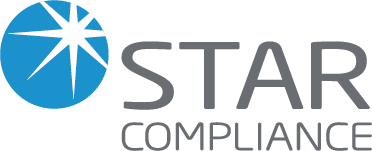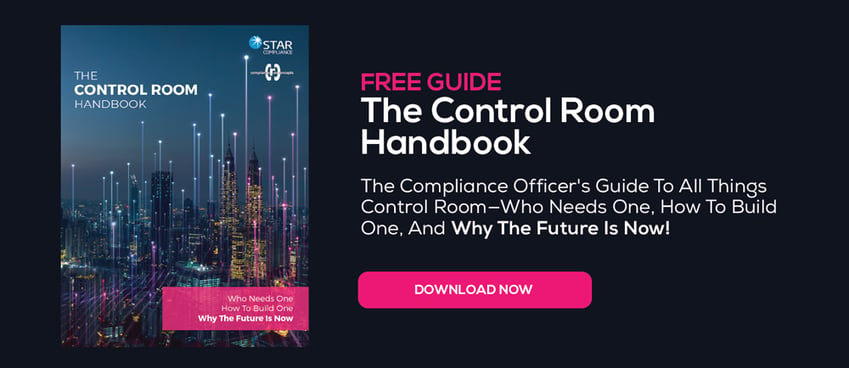We’ve talked a lot recently about how to build the perfect control room. Today we’re going to talk about how to find the perfect control room officer—the candidate with the right kind of experience and right kind of mind to complete your firm's control room puzzle
While tech is increasingly critical to an efficient and effective control room operation, you still need good people sitting above it all. People who can offer direction and leadership. People with the right kind of experience. And maybe most important of all, the right kind of mind to thrive in this most high-pressure of compliance jobs and in the process keep your financial firm on the right side of regulators. The final piece of the control room puzzle.
To help set your expectations about what you should be looking for in a control room candidate and why, here’s a non-exhaustive list of what you can expect a control room officer to be doing day-to-day:
- Attend and monitor origination and pipeline meetings.
- Attend morning trading calls.
- Attend morning research meetings.
- Monitor and control pipeline CRM access.
- Seek out opportunities to participate or monitor committee meetings.
- Attend new employee training to learn what analysts and associates are being taught.
- Talk with fellow compliance officers to understand what they do and educate them on the control room.
- Reach out across the enterprise to learn about all the products and services the firm offers.
- Develop relationships with legal counsel—both internal and external.
- Attend industry roundtables.
LEADERS CAN BE IMPORTED OR HOMEGROWN
Good leadership is a need that never goes out of style, no matter the profession. What does that quality look like in a control room officer candidate? Experience in the job obviously matters. That experience could be gotten elsewhere, say in a bulge-bracket firm, where said candidate already oversees a control room operation—a great option if you’re looking to build out a control room function for the first time.
Experience can also be found in your own firm. If you have a control room function it makes perfect sense to start looking there for someone to move up the chain of command. You can also bring someone into the control room from the general ranks of compliance, given they have the right qualities to succeed there. Someone from within will be able to hit the ground running, because they already possess a clear understanding of your firm's operations and services.
GOOD LEADERS ARE GOOD LISTENERS
Good leaders are also good listeners: people who can take what they see and communicate it clearly and concisely back to others. A good control room officer can connect all the right dots and draw all the correct conclusions from what she sees, but if she can't get her point across to an employee’s supervisor, other team members, or senior leadership, all the tech and compliance experience in the world won't end up doing the firm much good. A gifted communicator will also be well suited for training employees on code-of-conduct and compliance basics—fundamentals which should never be underestimated for their capacity to reduce firm risk.
BIG DATA DEMANDS A DATA GURU
This is the age of data. Big Data. Big because the digital age is creating so much of it that entire industries and professions have sprung up to try and make sense of it all. As such, an understanding of the importance of data—how to use it and how to do something of value with it—is of utmost importance in any control room officer candidate. “Data gurus” as one compliance leader from a large US asset manager put it, “are people who understand the information we have access to." A modern control room, using the latest control room software, will have numerous data feeds coming into it. It's the data gurus whose job it is to know precisely what's coming in on those feeds, and how to read and leverage that data to make important business decisions.
FIND YOUR SHERLOCK HOLMES
Asked to identify what he thought was an important characteristic of a good control room officer, Steve Brown—a control room veteran with 25 years of capital markets experience under his belt—didn’t hesitate: “Curiosity.” Compliance officers are puzzle solvers. Investigators. Sherlock Holmes in a suit. That means they need to keep their eyes and ears open for potential problems and enjoy identifying and fitting together all the puzzle pieces that go into monitoring for the potential misuse of MNPI and conflicts. A control room officer needs to be interested in what's going on everywhere, and stay tuned in to internal and external sources. Clues can come from compliance software, an overheard conversation, a mainstream media source, or a well-honed intuition.
A GOOD NETWORKER IS GOOD TO FIND
Finding a control room officer candidate who happens to be a good networker is icing on the cake. Last year in this space, we talked to a Chief Compliance Officer about the necessity of having a network of peers to meet regularly with, to discuss challenging aspects of the job or even just to bounce ideas off of. Best practices. Third-party vendor recommendations. Workflows. Any number of things a friendly and experienced ear can help out with. For this CCO, the network was a lifesaver many times over. Control room officers can benefit equally from their own network of fellow control room officers.
Steve Brown: “Running a control room is challenging. That's why it's so important to have colleagues working in other control rooms you can get on the phone with and ask: ‘So how are you doing this? How are you doing that?’ It can be questions about policies, procedures, controls, just about anything. And aside from the obvious benefit of perhaps helping you through a difficulty, these kinds of chats help keep you in the know. They keep you aware of what’s going on out there and trends to be aware of. Building out a network of people you can rely on is an important part of building out a control room.”
A GOOD TEAM LEADER IS A GOOD TEAM PLAYER
“The Tour de France is a 2100 mile bike race over 21 days,” offers Brown, also a cycling enthusiast. “That’s a marathon, not a sprint. And it’s a team effort: the riders have to rely heavily on each other and support staff, which made me think of the control room function, and the need for team players.”
One of the biggest challenges faced by control room teams is the sheer volume of the work—whether it’s clearing bankers for a deal team, staying on top of potential new conflicts, or managing the near-constant flow of MNPI. For Brown, working in a control room is a team effort—like the Tour de France—and the teams that make it successfully to the finish line of the control room marathon are those that work together. The right leader will be willing to get their hands dirty when the team needs help, encourage communication, and create a positive work environment so everyone can thrive. “Without a team approach to the control room function,” adds Brown, “control rooms can spin their wheels, to extend the metaphor, and critical conflicts can all too easily be missed.”



